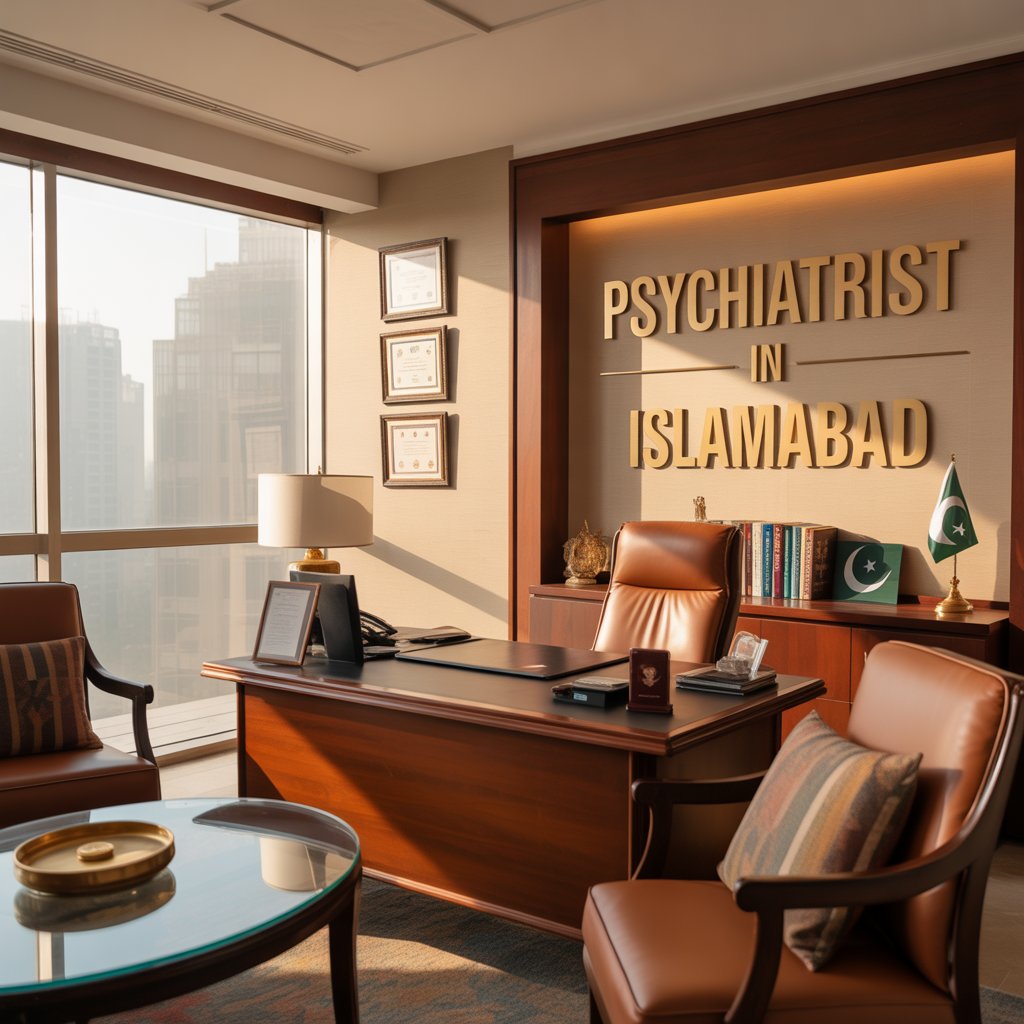Finding the Right Psychiatrist in Islamabad: A Guide
Taking the step to seek help for your mental well-being is a significant and courageous decision. It’s an acknowledgment that you deserve to feel better and that professional support can light the path forward. In a bustling city like Islamabad, knowing how to find the right psychiatrist in Islamabad is the crucial first step on this journey. A psychiatrist in Islamabad is a medical doctor (MD) specializing in mental health, qualified to diagnose conditions, provide therapy, and prescribe medication. This guide aims to demystify the process, helping you understand their role and how to find a professional who is not only skilled but also the right fit for you.
Understanding the distinct role of a psychiatrist is essential. Unlike psychologists who focus primarily on psychotherapy, a psychiatrist in Islamabad brings a medical perspective to mental health care. They are trained to understand the complex interplay between biological factors, brain chemistry, and psychological symptoms. This allows them to address conditions like major depression, anxiety disorders, bipolar disorder, OCD, and PTSD from a holistic standpoint. Consequently, your journey with a psychiatrist might involve medication management to correct biochemical imbalances, integrated with various forms of talk therapy to address thought patterns and behaviors.
When Should You Consider Consulting a Psychiatrist?
Recognizing the right time to seek help can be challenging. Generally, it is advisable to consult a psychiatrist in Islamabad when your emotional or mental state is significantly interfering with your daily life. Key indicators include:
- Persistent Feelings of Sadness or Anxiety: When feelings of hopelessness, worthlessness, or intense worry don’t seem to lift and impact your ability to function.
- Drastic Changes in Sleep or Appetite: This could involve sleeping too much or too little, or experiencing significant weight loss or gain without trying.
- Difficulty Coping with Stress: When everyday challenges feel overwhelming and your usual coping mechanisms are no longer effective.
- Withdrawal from Social Activities: Losing interest in hobbies or social interactions that you once enjoyed.
- Trouble Concentrating: Finding it difficult to focus at work or school, which is affecting your performance.
You don’t need to be in a crisis to benefit from seeing a psychiatrist. Many people seek help for personal growth, to improve relationships, or to better manage life transitions.
The Multifaceted Role of a Psychiatrist
A psychiatrist’s expertise extends far beyond simply writing a prescription. Their approach is typically comprehensive and tailored to the individual.
1. Comprehensive Assessment and Diagnosis
Your first appointment will likely be a detailed evaluation. The psychiatrist will ask about your current concerns, personal history, family medical history, and any symptoms you are experiencing. This thorough assessment is necessary to form an accurate diagnosis, which is the foundation for an effective and personalized treatment plan.
2. Medication Management
When medication is deemed beneficial, the psychiatrist will carefully prescribe and monitor its effects. They will explain the purpose of the medication, its potential benefits, and any possible side effects. Finding the right medication and dosage is often a process of careful fine-tuning, requiring open communication between you and your doctor. Follow-up appointments are essential to ensure the treatment is working effectively and to make any necessary adjustments.
3. Psychotherapy and Counseling
Many psychiatrists are also trained in various therapeutic modalities. They may provide psychotherapy themselves, or they may work in conjunction with a psychologist or therapist. Common approaches include Cognitive Behavioral Therapy (CBT), which helps reframe negative thought patterns, and psychodynamic therapy, which explores how past experiences influence present behavior. This combination of medication and therapy is often the most effective strategy for many mental health conditions.

How to Find the Right Psychiatrist for You in Islamabad
Finding a professional you trust and feel comfortable with is paramount to a successful therapeutic relationship. Here are some practical steps you can take:
1. Seek Referrals and Check Credentials
Start by asking your primary care physician for a recommendation. You can also ask trusted friends or family members. Furthermore, utilize verified online directories like Healingdoorrahab.com/, which list qualified professionals, their specialties, and patient reviews. Always verify that the psychiatrist is a licensed Medical Doctor (MD) with a recognized specialization in psychiatry.
2. Consider Their Specialization and Approach
Psychiatrists often have areas of special interest. Some may specialize in child and adolescent mental health, while others focus on addiction, geriatric psychiatry, or mood disorders. Look for a professional whose expertise aligns with your specific needs. Additionally, during an initial consultation, you can ask about their treatment philosophy to see if it resonates with you.
3. Prioritize Comfort and Connection
The therapeutic alliance is a powerful predictor of positive outcomes. It’s important that you feel heard, understood, and respected by your psychiatrist. Pay attention to how you feel during your first session. Do you feel comfortable being open and honest? Is the psychiatrist a good listener? Trust your instincts—the right fit should feel like a collaborative partnership.
Taking the First Step Toward Wellness
Choosing to consult a psychiatrist is an act of self-care and strength. It is a proactive step toward understanding yourself better and building a healthier, more balanced life. In a city like Islamabad, you have access to a growing number of highly qualified and compassionate mental health professionals. By taking an informed and thoughtful approach to your search, you can find a supportive guide for your mental health journey. Remember, seeking help is not a sign of weakness; it is the first step in reclaiming your peace of mind and moving toward a brighter, more hopeful future.
Frequently Asked Questions (FAQs)
1. What is the difference between a psychiatrist and a psychologist?
A psychiatrist is a medical doctor (MD) who can diagnose mental health conditions, prescribe medication, and provide therapy. A psychologist typically holds a PhD or PsyD and focuses on providing psychotherapy (talk therapy) but cannot prescribe medication.
2. How do I know if I need medication?
Not everyone who sees a psychiatrist needs medication. After a comprehensive assessment, your psychiatrist will determine if medication could be beneficial based on your diagnosis and symptoms. Medication is often recommended when symptoms are severe or when therapy alone has not been sufficient.
3. What should I expect during my first appointment?
The first session is primarily an assessment. The psychiatrist will ask you questions about your life history, current struggles, symptoms, and goals for treatment. This helps them understand your situation fully and begin formulating a treatment plan with you.
4. Are sessions with a psychiatrist confidential?
Yes, absolutely. Like all medical professionals, psychiatrists are bound by strict rules of patient confidentiality. Your discussions are private and cannot be shared with anyone without your written consent, except in very specific, legally mandated situations where there is a risk of harm to yourself or others.
5. How long does treatment usually last?
The duration of treatment varies greatly depending on the individual and their specific condition. Some people may benefit from short-term treatment for a specific issue, while others with chronic conditions may engage in long-term management, similar to how one would for a physical health condition like diabetes or hypertension.




